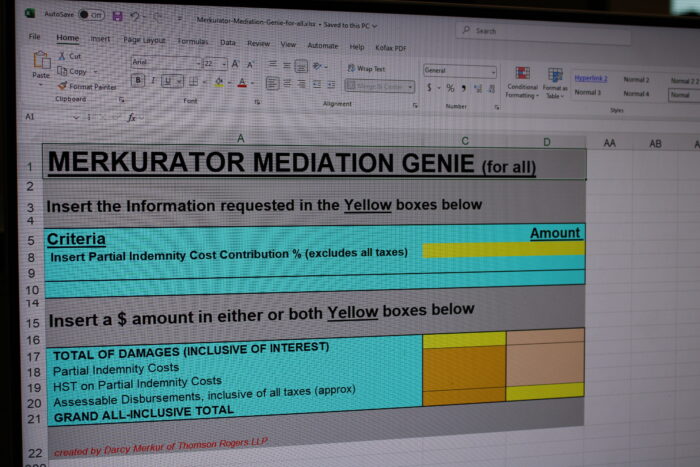Responding To Clients – Best Practices For Trauma Lawyers
Author(s): Darcy R. Merkur
September 9, 2021

Accident victims notoriously complain that they can’t get a hold of their personal injury lawyer. Should that be the case? Should it be so hard for a client to get a response from the trauma lawyers they hired to assist them in their time of need?
Trauma lawyers help people whose lives have been devastated as a result of an unexpected incident. Families dealing with catastrophic brain injuries and spinal cord injuries have time sensitive questions requiring a timely response.
Accident victims and their families already face major frustration waiting in line for medical attention, but should they have to wait to get answers from the personal injury lawyer they entrusted to help them?
I believe that to be considered a top personal injury lawyer in Ontario, the lawyer should adopt the following best practices when communicating with clients:
- Responsiveness – In my view, there is simply no excuse for a personal injury lawyer not to return a call or respond to an e-mail within one business day. Personally, I adopt a much quicker response time stemming from my view that a delayed answer is not really an answer at all. That said, where a timely response is not an option because the lawyer is on vacation, is at Trial or on Examinations for Discovery, etc., then their supporting team should at a minimum respond to the inquiry by explaining when the lawyer will be able to respond to the client in order to help manage the client’s expectations. Where I am unable to adequately respond in a timely way I typically respond immediately advising when I will be able to provide an adequate response so that the client knows I received their message and intend to answer their inquiry.
- Mode of Communication – While calls and e-mails are the obvious modes of communication between clients and lawyers, I allow clients to text me on the assumption that texting communication is more timely and responsive. People correctly assume that text messages are received and can often see that it was received depending on the person’s settings. Many lawyers understandably avoid texting with their clients for logical and practical reasons, like not having to respond to client inquiries after hours or difficulty dealing with certain more challenging clients, but in my view there are better options to manage some of those issues than simply avoiding texting with clients.
- Documenting Communications – My practice is to always send a memo summary of any important communication to the client so that they have a record of what was discussed. Texting, for example, is not readily recorded within a file so a memo summary is vital. A memo summary is extremely important in cases involving brain injuries where memory is a problem or in cases where multiple clients are represented so that the other clients can understand what was discussed without feeling out of the loop.
- Managing Expectations – The key to effective and timely communication between a client and a personal injury lawyer is for the client and lawyer to have an understanding of their responding protocol. If the lawyer is unavailable after business hours then clients should be aware of that and should be aware of when they can expect a response. Clients who are in crisis need answers quickly and they need a clear understanding of when they can expect a response. Vital to managing expectations is to document expectations. Too many lawyers over promise and under deliver by saying things like they will respond within 24 hours and when they fail to do so trust is lost and the client feels mislead.
- Delegating Responsiveness – There are many questions asked by clients that can easily be addressed by law clerks, legal assistants or associate lawyers. When I redirect a question to someone on my team, I invite my team to copy me on such responses so that I can chime in if anything was missed and so that the client can appreciate that I remain actively involved in all communications between them and our office. The client should not feel like they have been passed off to a subordinate, but rather that their question is being answered by the most suitable person on the team.
After a serious car accident or a serious injury resulting from a slip and fall, clients and their families need help and need to trust their advocates. Serious injury clients have concerns about the consequences of their injuries and limitations on their lifestyle, their income earning ability, their family structure, their parenting responsibilities, their relationships and a host of other issues. They should not feel like they are a nuisance to their lawyer and that they can’t get their lawyer’s attention to answer their questions.
I receive countless calls from potential clients who already have a personal injury lawyer but who are complaining about their lawyer’s lack of responsiveness. I always redirect them to their lawyer and advise them to try to schedule a meeting with their lawyer to discuss their issues. However, all too often, they call back advising that they continue to feel that their lawyer has not responded to their inquiries.
We must all strive to better help personal injury clients. These best practices should help personal injury lawyers do so. At Thomson, Rogers we aim to ensure that our personal injury clients have their questions answered in a timely way.
Thomson Rogers offers free consultations so please feel free to reach out to us at any time. We are here to help.
Darcy Merkur is a highly regarded Ontario trauma lawyer helping accident victims such as pedestrians, cyclists and motorists, who have sustained catastrophic injuries.
Darcy is the first lawyer in Canada to be qualified as a Certified Brain Injury Specialist by the Brain Injury Association of America. In addition, Darcy has been recognized as a Certified Specialist in Civil Litigation by the Law Society of Ontario, is listed in peer-reviewed publications – Lexpert® and The Best Lawyers™ in Canada, is ranked AV pre-eminent in Martindale-Hubbell ® and is a partner at Thomson Rogers, one of Canada’s Top 10 Personal Injury Law Firms as selected by Canadian Lawyer Magazine.
Darcy can be reached at 416-868-3176 or by EMAIL.
For Thomson Rogers updates please subscribe to our email list here.
Share this





